I wrote the original version of the following story almost twenty years ago, as the second chapter in an anthology of short stories, Ten Lies and Ten Truths.
I have rewritten parts of the story this week, to capture the new realities of
History 2021
A Story

Harrison Gillies sat alone in the teacher’s lounge of a prestigious New England private high school grading English essays. Paintings donated by the Art Department, an oriental rug, and a couple of decades’ accumulation of furniture lifted the room beyond its more humble beginnings. Gillies, nearing retirement, was slightly overweight. In an earlier era, he would have been smoking a pipe. From his comfortable chair by the window, he glanced at the clock, expecting the door to open any minute, as it did about this time on most Monday afternoons.
The latch clicked and his younger colleague, Sandra Murphy, walked in carrying file folders and papers. She smiled and went to the counter by the sink to pour hot water. They enjoyed having tea together during their mutual free period.
“Looks like we finally got them,” she said, holding up the papers. “This ought to silence them once and for all.”
“Nice to see you, too.” Gillies smiled. “When are you going to learn that it’s collegial to say ‘Hello’ or ‘How are you?’ before launching into a declarative sentence?”
She smiled, put the papers under her arm, and picked up the oversize mugs. He put the essays on a table next to his chair and took the warm mug she offered.
She stood in front of his chair. He sipped his tea and motioned her to the sofa on the other side of the table.
 “Here, I brought you a copy.” Murphy handed him three pages and sat on the sofa. Moving the pencil she was carrying to the table, she used both hands to pull back her light blond hair. “The Supreme Court just issued a ruling that should finally make things clear.”
“Here, I brought you a copy.” Murphy handed him three pages and sat on the sofa. Moving the pencil she was carrying to the table, she used both hands to pull back her light blond hair. “The Supreme Court just issued a ruling that should finally make things clear.”
Gillies adjusted his glasses. “Let me see.” He read aloud.
FOR IMMEDIATE RELEASE. Washington, DC (AP). June 17, 2023. In an 8 to 5 decision, the U.S. Supreme Court ruled today that the Declaration of Independence, along with President Washington ‘s Inauguration and Farewell Addresses, may no longer be displayed or read in public schools.
Citing the First Amendment, the court ruled that because there is a reference to God in each document, it is a violation of the Constitution’s prescribed separation of church and state to include the Declaration of Independence or Washington’s speeches in public education.
In addition, the display of the documents in government buildings and in other facilities supported with federal funds is also banned.
Gillies lowered the press release into his lap and looked over at his colleague. “This is pretty strong.”
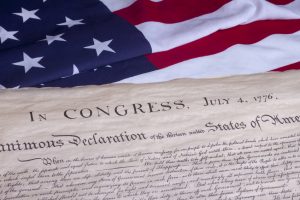 She eased back into the cushions on the sofa. “Yes, thank goodness.”
She eased back into the cushions on the sofa. “Yes, thank goodness.”
Each of them took a sip, and Gillies picked up the press release.
Writing for the majority, Chief Justice Diane Timmons-Fulton ruled that “American school– children will no longer be subjected to the narrow and bigoted view that the male imaged Judeo-Christian God, some other god, or any other religious construction was involved in the creation of our country.”
Speaking of George Washington and the other Founding Fathers, the Chief Justice wrote, “Either they were misguided at the time, or they did not foresee the implications of their personal beliefs on future generations. In either case, the court cannot allow words written over 200 years ago to improperly influence the citizens of our nation to believe in God, or in any other specific divine being.”
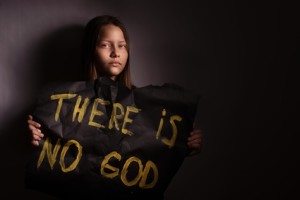
He lowered the papers and said, “But this is about public schools. We’re obviously private. And years ago, when we started, we were called a Christian preparatory school.”
“Yes, but some students and programs here get federal loans. And we of course still teach most Christian ethics—except a few obviously outdated ones—as we should. But not that ‘Son of God’ and ‘resurrected from the dead’ stuff, which are impossible.”
“Hmm.”
“But the intent of this ruling, since it includes all public buildings, is that it should be applied as widely as possible, and this gives us the ammunition we’ve needed to finally silence the God-squaders.”
Gillies nodded and looked at the release again. “I suppose your History Department will be investing in new textbooks.”
“Yes, though the ones we’ve been using for years don’t mention those speeches by Washington.”
He smiled and turned slightly in his chair. “Why are you so strident about this ruling?”
“Harrison, come on! We’re both white. I’m a privileged white, heterosexual woman whose parents had the resources to send me to college. I
“But I think you said you worked at college to make ends meet, went into debt, and then had to be pretty good to land this job—there had to be some individual achievement in there somewhere.”
“I wouldn’t have had a chance if I hadn’t been white, and with great parents. It’s not fair to others. We’ve got to change that. I’ve only been here five years, but look at all the faculty has accomplished–sometimes with the Administration dragging its feet–to cement reason, justice and sensitivity into the curriculum. We’ve had teachings and workshops on Black Lives Matter, Sexual Uncertainty, the inherent Prejudices of Meritocracies, The 1619 Project, Critical Race Theory, LGBTQ Rights, Systemic Racism, Social Justice, and many more. And we’ve implemented Admissions Equity.”
“Yes.”
“This religion thing is the final area where we have to eliminate, once and for all, the crazy ideas of the bigots and myth-believers. We’ve both been on the receiving end of those parents’ e-mails and conferences where they want us to allow students to say anything about their faith here at school, some of them implying that only Christians will go to heaven. If we did that, we’d have Christians berating Jews, then, next thing, Jews hating Muslims, and all of them ganging up on the atheists. The only safe way is to allow none of it. Keep all religious discussions out of school. And clearly the Constitution requires it, as this ruling implies.”
Gillies frowned and took another sip of tea before reading the second page.
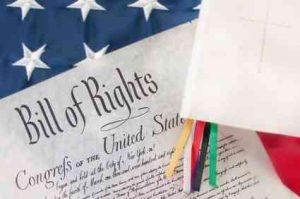
Justice Thrower pointed out that the First Amendment was specifically written to prevent Congress from “establishing” a central religion for the nation, that it guarantees free expression on all religious issues, and that the term “Separation of Church and State” never appears in the Constitution or the Bill of Rights.
“Denying our nation’s dependence on God has become a gross distortion of the intent of the Founders. They always encouraged the influence of religious thought in public policy.
“In addition, until the 1970s, generations of school children grew up reading these two important speeches by our first and greatest President. In them Washington gives the formula for the continuing success, safety, and prosperity of our nation, the key element of which is an abiding belief in God and adherence to His commandments.”
He looked up. “What do you think of that?”
She shrugged. “It doesn’t matter what I think. The Constitution creates a wall between church and state. Period.”
Her older mentor nodded. “Justice Thrower says it doesn’t, and that the First Amendment is only talking about Congress establishing a state religion.”
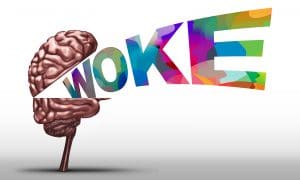
“Is it? Are we Congress? We’re a school.”
“How can you say that? You’ve complained about these overly-religious fanatics as many times as I have.”
Gillies laughed and set the papers in his lap. “Yes. I know. But you’re the historian. Isn’t what President Washington said a matter of history?”
“So what? It shouldn’t be used to brainwash people today.”
“It’s history.”
“And history shows us what happens when religion runs wild. Our future is too important. We have to mold that future by being careful what people say about the past.”
“Are you saying that’s what happened during the American Revolution—religion run wild?”
She glared at him. “You know what I mean. We can’t have religion at this school.”

“We’d have chaos!”
“But aren’t we in the business of education? The interchange of ideas? Haven’t you and I been on the frontlines of supporting diversity?”
“Some students would be hurt. It wouldn’t be right.”
“By words? Sandra, I teach English. If the school itself doesn’t take sides, and we insure that no one is unduly coercive, isn’t that the kind of dialogue we want?”
She shook her head. “Not about some sensitive subjects, and particularly about religion. Not with fundamentalist bigots. Again, our future is too important to let our history be defined by those who don’t understand.”
“Sounds like diversity-lite.” He picked up the paper. “Let me finish this.”
People for Truth in Government, which brought the original lawsuit, issued a statement foreseeing the same result in a similar suit to overturn the National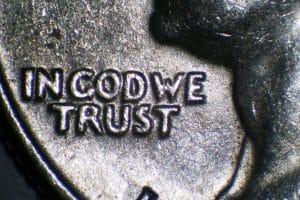
Chief Justice Timmons-Fulton concluded her ruling by stating that “since the United States did not officially exist until the Constitution was ratified in 1788, any ex-officio meetings, writings or communications which may have occurred in the years prior to that date, including the 1776 gathering in Philadelphia to write the Declaration of Independence, cannot be given any official status, and so it is only proper that this group’s narrow belief in God be stricken from the nation’s historic record and be accorded no particular significance.
“In addition, while President Washington certainly helped establish the nation and governed reasonably well in its early years, it is precisely his lasting prestige which today makes it inappropriate for others to force his antiquated views about God on later generations. Unsuspecting schoolchildren might be encouraged to believe that God actually exists simply because George Washington apparently believed so. This would be a great tragedy.”
He put down the pages. “You’re right. That’s pretty clear.”
She tapped her finger on the mahogany coffee table in front of the sofa. “So the next time a parent, or even a student, complains that we don’t allow the open expression of ideas on faith, religion, or whatever, we’ll just give them a copy of this and tell them that we’re following the law.” She turned to face him. “And I know you agree with me. You must!”
He leaned forward and looked down at the papers. “Yes, I suppose you’re right.”
“Sometimes I think you ask me questions just to get me going, to practice your Socratic teaching method. But I know you.”
“I admit, I do like playing Devil’s advocate. Forty years of teaching teenagers.” He leaned back and looked out the window. “But there is something about this that bothers me.” Gillies scratched his face, then wrapped his hands around the mug and held it in his lap. “When I was a graduate student at The University of London in the 80s, a Soviet student lived in my dorm. He was one of the few allowed to study abroad in those days. He was a little older than me, and much smarter. Over several months we became friends.”
He paused, his mind obviously on the past.
“I don’t know how it came up. Maybe an anniversary of World War II. Anyway, he didn’t believe that his country had invaded Poland a few weeks following Germany in 1939.”
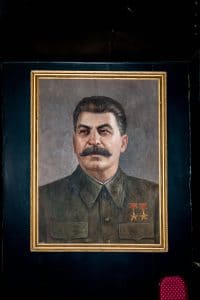
He nodded and looked her way. “A-plus, historian. But, you see, Sergey had no knowledge of it. In fact, he got angry with me for even suggesting that his country could do something so despicable as to invade a peaceful neighbor. He was absolutely sure I was wrong.”
She shrugged her shoulders. “But you were right. Facts are facts.”
“Not to Sergey. He only knew the facts that Stalin had rewritten. The government didn’t want its people to know the real facts-for the greater good of ‘socialist reality.’ In just one generation, Stalin’s rewrite won, and the truth was lost to all but a handful of people.”
Sandra was silent. “But surely you don’t equate what Stalin did to this?”
He smiled. “Stalin wasn’t as eloquent.”
“Come on.” She dismissed his words with a wave of her hand.
He sat up and turned all the way to face her. “No, I’m serious. You and I might agree with the outcome for now. But our own government has just ruled that the real truth can no longer be taught. In a generation, it, too, will be gone and forgotten. I can imagine some young Americans in twenty years arguing that President Washington could never have believed in God–that it would be impossible because, as far as they knew, Washington never mentioned God in his writing or his speeches.”
“Well, maybe that’s OK. Our country will be better off without people believing myths, and then coercing others to believe them as well. Hopefully they’ll all be gone in another generation, if we stand our ground and keep teaching the truth.”
“So it’s all right to bend the truth for a good reason?”
“Yes, of course. Why wouldn’t it be?”
“Because we might turn out to be a lot more like the Soviet Union then, or like China today, in every respect, if we continue on that path.”
“Harrison, come on. That could never happen here.”
“Why?” He held her eyes.
“Because this is America.”
Lie: The Founding Fathers did not acknowledge God’s important role in the founding of this nation.
Truth: The majority of the Founding Fathers were Christians or Deists who believed in God and actively gave Him credit for acting in their daily lives and for founding this nation. They based America’s laws on Biblical laws, quoted scripture in their writings and debates, and fully expected the nation to maintain its Christian heritage so that morality and ethics would make the rule of law possible.
Thank you for reading “History 2021”.
I’m pleased to let you know that as of today you can now download a FREE E-Pub copy of the entire second edition of Ten Lies and Ten Truths as a gift. To do so, please follow this link to select the format you prefer. There are no strings or requirements.
And please tell your friends about this free book!
The print copy is also available at Amazon for $12.99, but the E-Pub copy is now FREE, here. So please enjoy!
If you would prefer a FREE E-Pub copy AND subscribe to this blog for monthly posts, please follow this link. We hope to give you much to think and to pray about in the future.
Now, take a look at these resources at the intersection of Faith, Economics and Policy:
https://patriotpost.us/documents
https://www.americanvision.org
https://www.str.org/articles/america-s-unchristian-beginnings#.Vga-jdJViko
Os Guinness – A quiet voice on behalf of faith, freedom, truth, reason and civility
Is the U.S. a Christian Nation? (parkerhudson.com)A Unique Faith Grounded Our Unique Nation. Now What? (parkerhudson.com)
Faith Isn’t Deplorable (parkerhudson.com)
Barton, David. Original Intent: The Courts, the Constitution, & Religion. Fifth Edition. WallBuilder Press, 2008.
Barton, David and Barna, George. U-Turn: Restoring America to the Strength of its Roots. Frontline, 2014.
DeMar, Gary. America’s Christian History. Eighth Edition. American Vision, Inc., 2007.
For the latest updates go to parkerhudson.com/blog. There you will find many posts on the Christian foundations of our nation; one is at this link. Please enjoy the Archives by Category and Tags.

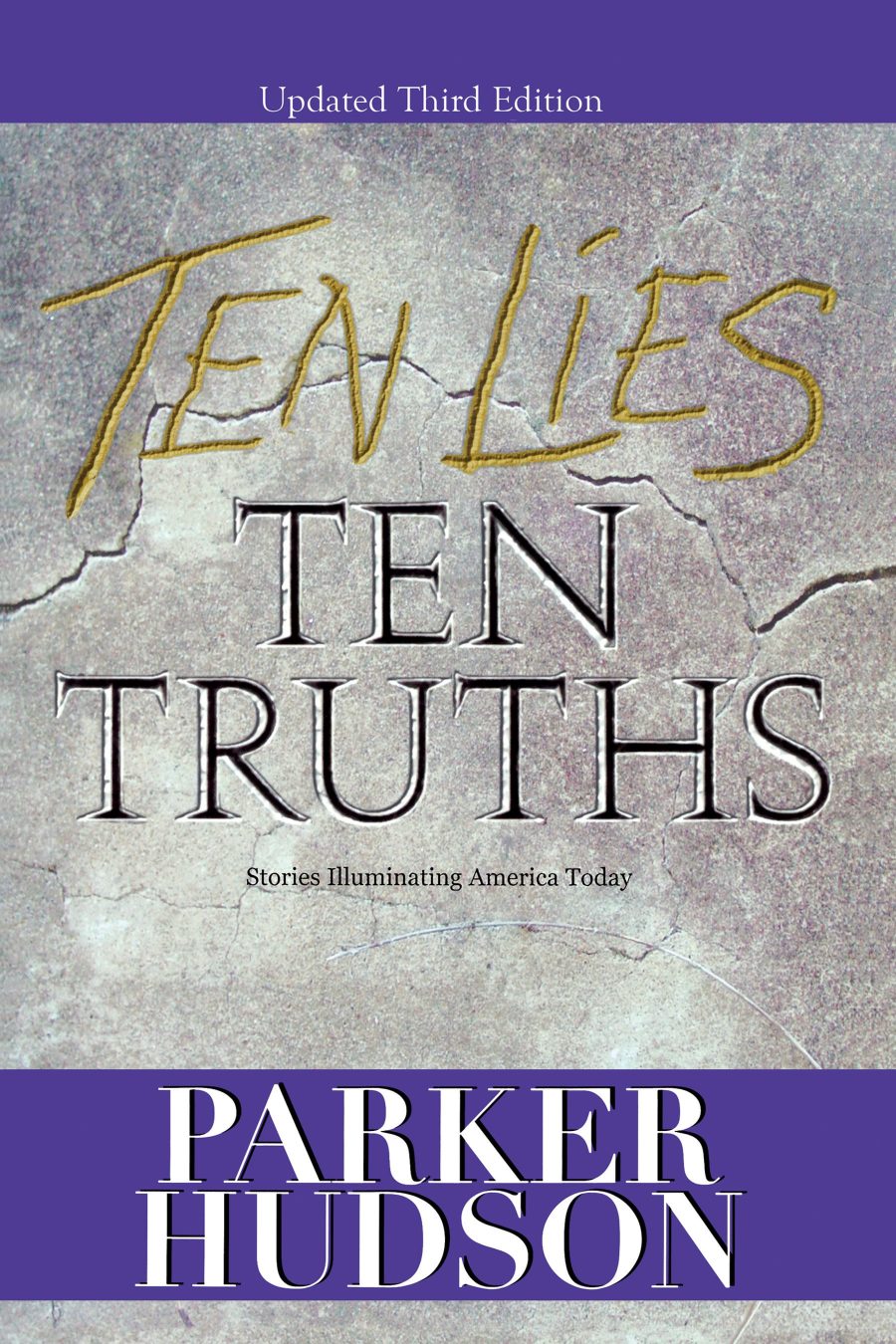
Comments